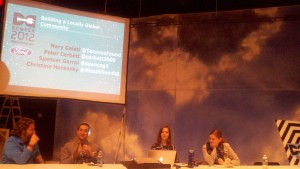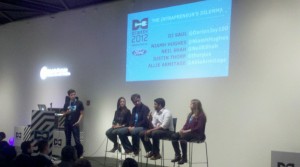DCWeek in Less Than 180 Seconds
Top DCWeek quotes and tweets (followed by my own reflections):
Technology catalyzes community; technology doesn’t create community. @spenceg1
Yes, no matter how much technology that you throw at it, community is still about the people. This is just as true of online communities as it is of offline communities. What are you doing to foster a sense of belonging, a sense of engagement in your organization?
When you’re building community, leverage pre-existing communities. @corbett3000
Peter’s quote here and subsequent comments gave me this sense that we all live in overlapping communities. Also, there are pre-existing communities. That doesn’t mean that there’s not room for more or a need for more specialized or localized (or global) communities. What it does mean is a lot more optimistic: you don’t have to start from square one. What organizations can you partner with to co-promote opportunities that would benefit both?
Design of interface creates a space just as it does in physical world, sends a message. @spenceg1
Spencer talked about how literally rolling out a red carpet would make visitors to an office feel welcome. This can be done in the digital space as well. Design sends a message. What does the design of your web site, blog, and/or registration forms say about your organization? What message are you sending?
Talking about a successful Library of Congress project using @Flickr. Cost $35. @thorpus
Justin Thorp touched on how a limited budget doesn’t need to limit creativity, innovation, and impact. The project he cited went on to be one that the Library of Congress touted as one of its most successful for that year. What low-cost solutions could be game changers for your organization?
You’re not an #intrapreneur by position, you’re an intrapreneur by mindset. @NeilRShah
What really struck me in this session is how being an entrepreneur is not an either/or proposition. It’s possible that right now within your organization you have individuals who- given the right resources, time, and support- could develop the next great idea. Don’t force them out. Give them the opportunity to tap into their creativity, skills, and experience to make a difference.
I really enjoyed the Pitch Jam! session where 24 start-ups gave 60-second pitches and were evaluated by a panel of judges on their presentations. Below you’ll find the ones that stood out to me for their applicability to associations, non-profits, and other organizations.
@TeamVisibility (cloud-based service that lets you see, hear and coach a team)- A resource like this could prove to be useful for sales, customer service, or other teams that are not in the same location and are interested in improvement and effectiveness.
@Markerly (A highlighter for published content with powerful sharing functions to drive more visitors)- Incorporating a tool like this can make it easier for individuals to share content from your web site and increase engagement with repeat visits.
@BarrelofJobs (crowdsourcing for jobs)- What could this concept mean for Monster, CareerBuilder, LinkedIn, etc.? What could the effect be for association and non-profit job boards or how could they tap into the power of friends referring friends for jobs?
@BlastRoots (free grassroots advocacy campaigns)- It’s important that associations, non-profits, and other organizations understand these kinds of tools and how to leverage them to motivate their constituencies to action.
@CrimePush (safety intelligence app)- A tool like this could have a wide impact as associations and non-profits work with college campuses, local jurisdictions, and conference host cities to create safer environments for students, citizens, and attendees.
@socialtables (event planning software)- “An opportunity for your target audience to connect with each other, your brand, and your cause.” is one of their mantras. Social Tables is finding a way to make putting events together easier and the end result more impactful. What could this mean for your organization and its conferences, fundraisers, etc.?
Also, here’s a link to Steven Overly’s DC Week recap from The Washington Post and @TechGirlTweets‘ post on IAmDTech’s Relaunch during DC Week (including videos). Thanks, Keisha.
What stood out to you from DCWeek? What lessons did you learn? What speakers or blog posts did you find to be insightful?
Top ChatterBachs Posts & Pages
- 2014 Session Topics
- What's the one area where you want to see improvement in 2014?
- Strengthen Community Bonds by Being Social
- What I learned when the president of Cinnabon bought me coffee at Starbucks
- Random ChatterBachs Musings and Updates
- Vine, Instagram, and the Evolving Visual Web
- Engage Your Audience like Dove Does
- Facial Recognition and the Future of Personalized Marketing
- digitalNow 2013 in Less Than 180 Seconds- #diginow13
- The Greatest of Great Ideas in Less Than 180 Seconds- #ideas13

